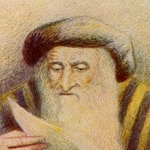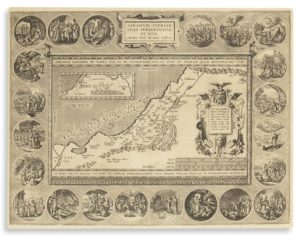Rabbi Rashi and the Messiah Prophecies
Rabbi Rashi, considered one of Judaism’s greatest interpreters of the Talmud, emerged at a time when the Dark Ages were transitioning from rule by barbarian tribes like the Huns, Goths and Franks into the feudal era when kings, queens, knights & lords ruled Europe.[1] In the year 1040, Shlomoh Yitzha was born in Troyes, France.[2]
 As a Rabbi, Rashi was renowned for his wisdom and interpretation of the Talmud in simple terms. Jewish academies widely accepted and valued his commentaries mostly captured and documented by his students.[3]
As a Rabbi, Rashi was renowned for his wisdom and interpretation of the Talmud in simple terms. Jewish academies widely accepted and valued his commentaries mostly captured and documented by his students.[3]
Commentaries of Rashi include some prophecies foretelling the arrival of the Messiah recognized as such by Christian authorities. One of the earliest is found in Jacob’s blessing of his son, Judah:
Gen 49:8-10 “Judah, [as for] you, your brothers will acknowledge you. Your hand will be at the nape of your enemies, [and] your father’s sons will prostrate themselves to you. A cub [and] a grown lion is Judah. From the prey, my son, you withdrew. He crouched, rested like a lion, and like a lion, who will rouse him? The scepter [shebet] shall not depart from Judah, nor the student of the law from between his feet, until Shiloh comes, and to him will be a gathering of peoples.” (The Complete Jewish Bible with Rashi Commentary)
Rashi’s interpretation of Jacob’s prophecy included three prophetic aspects. Judah like a lion foreshadowed David who would become like a lion when the people made him their king.
The scepter, the Rabbi said, represents the royal lineage of “David and thereafter.” Shiloh refers specifically to “King Messiah, to whom the kingdom belongs.”[4]
Another Messiah prophecy involved Moabite King Balak who realized his army could not defeat the Hebrew’s. His strategy, instead, was to press the prophet Balaam to place a curse on the approaching Hebrew nation, but Balaam’s response was a prophecy doing just the opposite:
Num 24:17 “I see him, but not now; I behold him, but not near; A star shall come forth from Jacob, A scepter [shebet] shall rise from Israel, And shall crush through the forehead of Moab, And tear down all the sons of Sheth.” NASB
Hebrew text translations vary slightly between Christian and Jewish Bibles where a word in Hebrew text must be deciphered by translators. Christian Bible translations typically read “I see him, but not now;” Jewish Bible translations read “I see it, but not now” although the context inferred by the remainder of the prophecy is about a king, a male.[5]
Rashi commented the opening phrase refers to the “greatness of Jacob” at a future time. Hebrew word shebet is translated in the Jewish version as “staff” whereas the same word is earlier translated as “scepter” in Jacob’s prophecy.[6] Consistently, the Rabbi’s commentary says shebet represents “a king who rules dominantly.”
Micah 5:1/2 is a prophecy making specific reference to a future ruler of Israel and Bethlehem Ephrathah, the home town of King David. Micah’s prophecy is understood by Rashi, though opposed by some Jewish authorities, to mean the Messiah would be born in Bethlehem Ephrathah in the royal lineage of King David.[7] His phrase-by-phrase breakdown with commentary:
Mich 5:1 (or v.2) “And you, Bethlehem Ephrathah – you should have been the lowest of the clans of Judah-from you [he] shall emerge for Me, to be a ruler over Israel; and his origin is from of old, from days of yore.” – The Complete Jewish Bible with Rashi Commentary
“And you, Bethlehem Ephrathah”: [Rashi] “whence David emanated, as it is stated (I Sam. 17:58): “The son of your bondsman, Jesse the Bethlehemite.” And Bethlehem is called Ephrath, as it is said (Gen. 48:7): “On the road to Ephrath, that is Bethlehem.”
“you should have been the lowest of the clans of Judah”: [Rashi] You should have been the lowest of the clans of Judah because of the stigma of Ruth the Moabitess in you.
“from you shall emerge for Me”: [Rashi] the Messiah, son of David, and so Scripture says (Ps. 118:22): “The stone the builders had rejected became a cornerstone.”
“and his origin is from of old”: [Rashi] “Before the sun his name is Yinnon” (Ps. 72:17).
Commenting on “the stigma of Ruth the Moabitess,” Rashi said it is the reason Bethlehem is called “the lowest of the clans of Judah.” Expressing his distaste of Ruth, a Gentile, Rashi viewed the prophecy as defining her in the lineage of the Messiah, unsavory to have a Gentile in a Hebrew lineage.[8]
Ruth was the Moabite daughter-in-law of the Hebrew Naomi, whose inheritance lost by the deaths of male family members, was redeemed by marriage to the Hebrew Boaz. Grandparents of Jesse, the couple were the great grandparents of King David.
Boaz himself was the son of Salmon who had married Rahab, a Gentile prostitute.[9] Rahab was the hero who hid two Hebrew spies being sought by the Jericho King’s posse, then helped them escape.[10] As a reward, Rahab was spared by the Hebrews when they destroyed Jericho.
Leaving no doubt his interpretation of Micah 5:1/2 is a Messiah prophecy, Rashi explicitly said the future ruler of Israel would be “the Messiah, Son of David” citing Psalms 118:22 as another messianic prophecy. The Messiah’s divine characteristic, “and his origin is from of old,” is called Yinnon by Rashi, a Hebrew epithet meaning “be continued.”[11]
Zechariah 12:10 is a prophecy foretelling the Messiah’s manner of death, according to Rashi. Taking a side in the split view of Talmud contributors in Talmud Sukkah 52, he commented, “And our Sages expounded this in tractate Sukkah (52a) as referring to the Messiah, son of Joseph, who was slain.”[12]
Christianity’s agreement with Rashi on the Messiah prophecies of Jacob, Balaam, Micah and Zechariah, part company on another prophecy, Isaiah 7:14.[13] Isaiah’s prophecy, Rashi taught, was not about a virgin birth, rather it referred to Manoah’s wife, mother of Sampson, the Biblical strongman.[14]
As a Rabbi, Rashi obviously did not believe Jesus of Nazareth was the Messiah primarily due to a particular disqualifying reason. Specifically it was the circumstances of his death, according to JewishEncyclopedia.com citing Rashi – Jesus was hanged:
“The very form of his punishment would disprove those claims in Jewish eyes. No Messiah that Jews could recognize could suffer such a death; for “He that is hanged is accursed of God” (Deut. xxi. 23), ‘an insult to God’ (Targum, Rashi).”[15] – Jewish Encyclopedia
Crucifixion of Jesus as a historical fact is undisputed by Judaism nor the birth of Jesus in Bethlehem in the royal lineage of the House of David. Ultimately, the question between Christianity and Judaism remains…what are the odds Jesus of Nazareth was a fulfillment of the Messiah prophecies?
Updated December 21, 2023.

This work is licensed under a Creative Commons Attribution-NonCommercial-NoDerivatives 4.0 International License.
REFERENCES:
[1] “Dark Ages.” New World Encyclopedia. 2013. <http://www.newworldencyclopedia.org/entry/Dark_Ages> “Middle Ages,” “Feudalism,” & “Renaissance.” Encyclopædia Britannica. 2017. <https://www.britannica.com/event/Middle-Ages> <https://www.britannica.com/topic/feudalism> <https://www.britannica.com/event/Renaissance> “feudal system.” Vocabulary.com. n.d. <https://www.vocabulary.com/dictionary/feudal%20system>
[2] “Rashi (Solomon Bar Isaac).” Jewish Encyclopedia. 2011. <http://jewishencyclopedia.com/articles/12585-rashi-solomon-bar-isaac> “Rabbi Shlomo Yitzchaki (Rashi).” Chabad.org. 2017. <http://www.jewishvirtuallibrary.org/rabbi-shlomo-yitzchaki-rashi> Segal, Eliezer. “Rashi’s Commentary on the Talmud.” University of Calgary. n.d. <http://people.ucalgary.ca/~elsegal/TalmudMap/Rashi.html> “RASHI – רש״י.” Geni. photo. 2022. <https://www.geni.com/people/RASHI-%D7%A8%D7%A9-%D7%99/6000000006709501378>
[3] “Rabbi Shlomo Yitzchaki (Rashi).” Chabad.org.
[4] Rashi. The Compete Jewish Bible – with Rashi Commentary. Gensis 49. <http://www.chabad.org/library/bible_cdo/aid/9952#showrashi=true> “Rashi (Rabbi Shlomo Yitzchaki).” Jewish Virtual Library. 2017. Mindel, Nissan. “Rabbi Shlomo Yitzchaki (Rashi).” Chabad.org.
[5] Net.bible.org. Hebrew text. <http://classic.net.bible.org/bible.php>
[6] Net.bible.org. Hebrew text shebet <07626> Numbers 24:17. Rashi. The Complete Jewish Bible with Rashi Commentary Commentary.
[7] “Jesus of Bethlehem.” MessianicJewishTruth.com. n.d. Archive.org. 2013. <http://web.archive.org/web/20131103080951/http://www.messianicjewishtruth.com/Jesusbethlehem.html> “Who will emerge from Bethlehem.” Teshuvas HaMinim. 2011. Archive.org. 2012. <http://web.archive.org/web/20120902023316/http://www.teshuvashaminim.com/michah51.html>
[8] Mendel. “Rashi (Rabbi Shlomo Yitzchaki).”
[9] Joshua 2.
[10] Joshua 6:25; I Chronicles 2:11; Matthew 1:5.
[11] Yinon (Yinnon).” eTeacherHebrew.com. 2016. <http://eteacherhebrew.com/Hebrew-Names/yinon-yinnon> Interlinear Bible. Psalms 72:17. BibleHub.com. 2014. <http://biblehub.com/interlinear>
[12] The Compete Jewish Bible – with Rashi Commentary. Zechariah 12:10 <http://www.chabad.org/library/bible_cdo/aid/63255/jewish/The-Bible-with-Rashi.htm> Soncino Babylonian Talmud. Sukkah 52a. <http://www.halakhah.com/rst/moed/16b%20-%20Succah%20-%2029b-56b.pdf>
[13] The Complete Jewish Bible with Rashi Commentary. Isaiah , Chapter 7. “Who is the Almah’s son?” Teshuvas HaMinim. 2011. Archive.org. 2012. <http://web.archive.org/web/20120425022737/http://www.teshuvashaminim.com/isaiah714.html> Robinson, B.A. “Isaiah 7:14 “Behold, a virgin shall conceive…”” Religious Tolerance. 2007. <http://www.religioustolerance.org/chr_proi.htm> Gill, John. John Gill’s Exposition of the Whole Bible. Isaiah 7:14. 2017. https://www.studylight.org/commentaries/geb.html>
[14] The Compete Jewish Bible- with Rashi Commentary. Isaiah 7:14. CR Judges Chapter 13.
[15] “Jesus of Nazareth.” Jewish Encyclopedia. 2011.;
